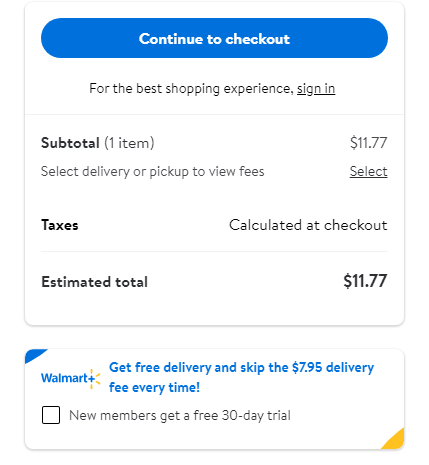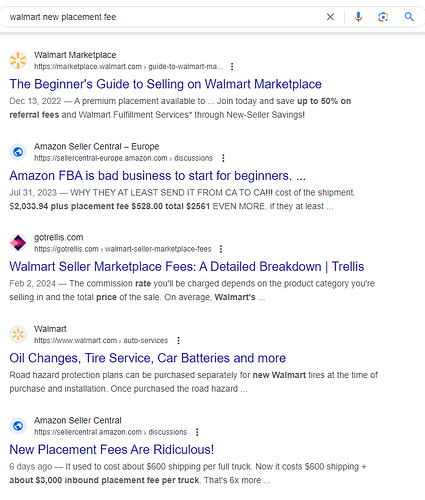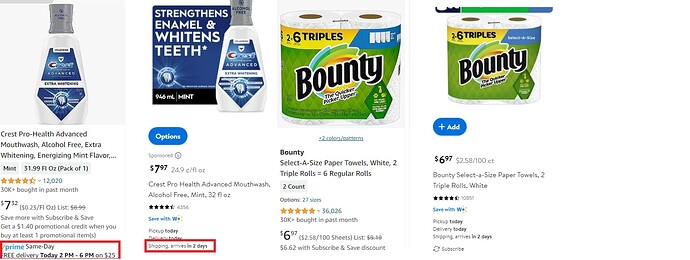Can you say “monopsony”? Sure, you can!
Shame the FTC has been neutered and won’t take action till long after Amazon has collapsed on its own.
Part of this is because of how the FTC runs itself. A while ago, if the FTC even threatened to take action on an anti-competitive merger, a lot of times it would be called off or major concessions would be made. Then the FTC started trying to block mergers that have no real basis to be blocked, and they would lose those cases in court. Nowadays there’s no longer fear of an FTC lawsuit, but it’s just considered a cost of doing business to go to court if there’s an FTC challenge to a major merger.
Just like this article, the FTC is “probing.” They’re always “probing” something nowadays and a lot of it has no basis. Things like this should be kept close to the chest and only made public when there’s a real strong case, so that it’s taken seriously instead of just blown off as another FTC baseless accusation. The FTC of the past rarely bluffed and when they did it wouldn’t be called because they were generally successful. Today’s FTC is constantly bluffing and losing so that erodes a lot of their power.
If they bring a case for this, it’s almost a sure loser unless they can point out another 3PL service where the all-in cost per item is lower than the all-in cost per item for FBA (with a similar level of service as well). I can’t find one and nobody else here has found one (if someone has I’m sure it would’ve been pointed out as an FBA alternative), so I doubt the FTC can pull one out of a hat. It’s hard to argue a company is being anti-competitive when they’re the cheapest offering on the market.
They can be found with the new distribution fees now. There are many items that run outside of the AWS service that can be seller fulfilled far cheaper now. Oversize is a perfect example along with hazmat. Neither of these items were ever transferred in the FBA system. I can do a lot with $15/unit for distribution costs for 12x12x12" @23 lbs. You can pay a lot of shipping costs for the handling fees and storage of AWS (post edit AWD) too if you already have an internal logistics system. Most U.S. based companies are not only Amazon sellers, so why would they pay AWS to do what they have to pay for in their operation to handle the rest of their off Amazon distribution. The core issue is that Amazon will suppress rankings for SF products that don’t use FBA or that will give FBA the BB over a SF item at the same level of shiping performance.
We have 3 warehouses 2 of which rarely have any Amazon operations. We are not closing any of them even if we used AWS (post edit AWD), because we still need them to handle our regional off-Amazon distribution.
This all boils back to the buy box manipulation for FBA. All things equal, the BB is still eschewed to FBA in a incalculable way which IMO is nefarious to everyone.
Multi channel fulfillment is horrendous ever since they did a massive fee hike on that end. Nobody with serious volume uses FBA to fulfill off-Amazon sales. But as for FBA’s fees for on-Amazon sales, I don’t think anybody else can compete with that.
Part of “Prime” is also hassle free returns, which not all FBM sellers offer. Sellers can also sign up for Seller Fulfilled Prime which will put them on even ground with FBA sellers and get them the Prime badge. This is part of the reason why they walked back the SFP fee last year, because they need this option to exist (without an additional levy) so any kind of FBA is anti-competitive claim falls apart. They may need to make SFP enrollment more accessible in order to fight any anti-competitive claims, which I’m sure they’ll do if push comes to shove. As long as the option is there Amazon can point it to and say if you don’t like FBA, fulfill it yourself. The fact that the seller doesn’t have a nationwide network of warehouses is their problem, not Amazon’s.
I will say I am biased on this, as I have FBM competitors on listings and do not want their offers to be competitive.
Never brought up MCF for the reasons you stated. Most domestic sellers have internal logistics for that.
You can now for oversize due to the distribution fees for all the other non AWS supported products. AWS fees added into that logistics cost also close the previous gap if one is trying to avoid the distribution fees. Those handling charges and storage are not even close to zero.
The question here is who does the pushing or shoving? There are a million things Amazon “should” do. Many of our products are not prime even with FBA due to size but they still are given the buy box over our sister company who is MF at the exact same price even when the delivery is regional and faster.
Amazon will give FBA the BB with a 7 day delivery despite the MF company having 2 day delivery for the same price. Having seen the performance of the average MF seller in my decade on Amazon I can see the argument for the performance assumption, but tacking on $10-15 a unit and expecting to keep the BB. No.
The real question is will the search engine and ranking drop for a SF item.
Helium 10 demonstrates those items will because they have historically.
This will only help China companies. Hopefully Peter Zeihan is right and they only have a decade of cheap labor left.
I thought by saying off-AWS you meant off-Amazon sales.
AWS = Amazon Web Services so I thought you were using it as some kind of abbreviation for the Amazon marketplace.
Unless you meant AWD? (Amazon Warehouse and Distribution)
If yes, then yes that will mostly help China sellers. Whether or not they have cheap labor left isn’t that relevant since there’ll always be some other cheap country to import stuff from. The countries that are running click farms right now will probably be the next hubs for cheap manufacturing labor, and they’ll be primed to hit up Amazon since they already know all the black hat tactics that are being outsourced to them at the moment.
Anyway, back to the subject at hand, if the MF company has 2 day regional delivery, it’s probably worthwhile for them to do SFP, in which case they should be favored over the slower FBA delivery. And yes, the performance assumption for FBM sellers is terrible, and Amazon likely has the numbers to back up those assumptions as there really are a lot of terrible FBM sellers. It’s not just delivery speed, NCX rate likely accounts for a big part of it too, and there’s a lot of FBM sellers who try to avoid letting people return things which is problematic. Amazon’s 1 size fits all approach, of course, punishes good FBM sellers as well.
Yup I did. No coffee this morning, switching to Monster in 10 minutes.
My point was even with SFP or not, Amazon will default to the FBA inventory.
There is the use of that word again… My former military brain prefers the words “shall” and “will” in running a business feeding employees families.
Agreed with all of this, but this “should” be published or demonstrable to other sellers and the consumer, instead of 5 silly unrelated to performance buyer opinion star rating.
Maybe the FTC should have looked into Walmart when they started this BS in Jan.
Here are some differences in Amazon’s defense (I can’t believe I just wrote that):
- Their placement fees are next to impossible to avoid.
- Walmart (WFS) will not split a pallet shipment onto multiple pallets to avoid the fees.
- Walmart has no plan to reduce their WFS (pick/pack/ship) fee to somewhat compensate for their placement fees.
Investigating walmart doesn’t have the same ring to it as investigation amazon though.
Yes, I am aware. Doesn’t fit the typical MO though as both obviously have the ability to pay.
I’m not going to get political about this but what I will say, being a seller on both marketplaces, is that Walmart is a lot worse than Amazon in this regard.
The biggest test to this whole thing is if Amazons customers are willing to eat this, because logistics costs WILL be passed along to the end buyer.
With Amazon adding ads to their video service as well as missing 2 day delivery for a large chunk of non-urban/metro shipments, consumers will probably/hopefully start to shop around again. Just like Doordash customers are starting to realize a Big Mac meal for $30 is not a good deal all things considered.
Well, it seems like the FTC’s definitely playing the politics/PR game instead of actually bringing a case on it’s merits. Walmart is Amazon’s biggest competitor, not some random company nobody gives a crap about.
Amazon does have more sellers, and they certain whine louder than Walmart sellers.
So the first non-walmart.com result for a search for walmart’s new placement fee is…
Amazon sellers complaining about the placement fees, one post from last year from the euro marketplace, and one recently on NSFE.
In the FTC’s defense, the laws they are working with predate the internet in most regards.
3P sellers will almost certainly hike prices in lower margin categories. Or die. But Amazon.com offerings are still cheaper than most stores. Go compare how much stuff costs at your local walgreens compared to Amazon for daily stuff like paper towels and mouthwash.
Took a look at a couple common items vs walmart (both of which are cheaper than most stores). Amazon seems competitive. Walmart does offer same day delivery as well, but I don’t know what, if any fees are associated with that service.
I doubt Walmart charges fees to themselves. Listings on Walmart with same day are ALWAYS sold by shipped by Walmart. Same day is not avail to 3P sellers, even if they use WFS. Best they got for that is 2 day delivery.
Usually same day delivery services charge the customer something to use it.
Seems they do have Walmart Prime though.

The FTC has been taking novel actions the past 3 years and losing many cases based on novel actions.
If we assume they are acting in good faith, it has to take time to create new interpretations of existing laws in order to bring cases which bear no resemblance to previous enforcement actions.
I assume the FTC would prefer to win than lose its enforcement actions.
I anxiously await seeing how the FTC justifies transferring the costs of warehouse transfers to Amazon rather than the sellers. Especially since it offers the sellers the ability to pay Amazon for it if they choose.

